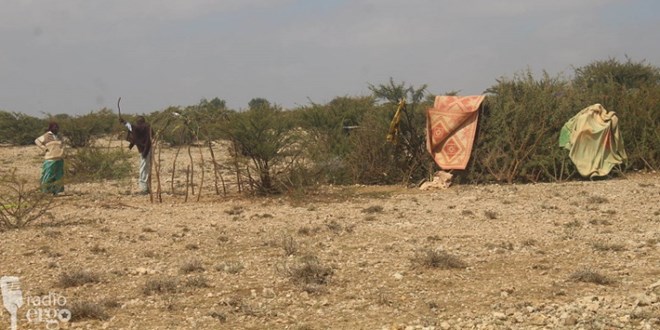
Sunday November 21, 2021

Thousands of pastoralists in different parts of Somalia are struggling with water and food shortages due to the drought caused by successive failed rains.
Afmadow district in southern Somalia’s Juba region is among the worst hit areas, with pastoralists unable to afford to buy their basic needs as their sick livestock have no market value. Radio Ergo’s Fowzia Barre interviewed Afmadow district commissioner, Mohamed Amin, on the current situation facing the pastoralists there.
Mohamed Amin: The situation is dire. There is hunger, and the pastoralists are losing the livestock they have been working so hard to raise. They are neither getting milk from the livestock, nor meat if they were to be slaughtered for consumption. We fear people will die. Some of the pastoralists with relatives in the town have already left the rural areas and have come to stay with their relatives here in town.
Radio Ergo: How are you helping these pastoralist families who are losing their livestock?
Mohamed Amin: Afmadow is a large municipality. We have a self-appointed committee of elders who are visiting the affected villages to assess their situation.
The elders with the help of local imams and voluntary groups are collecting money from the local community to assist the affected pastoralists. They deliver water trucked from wells in the town. Water can be trucked to the families as it costs at most $200, but the problem is these people don’t have food and giving them just water is not enough.
When people don’t have food and water, the best solution is to lift them from the drought-affected rural area to the town, where they can get food and water. But there is no place in the town that has been prepared to accommodate these families.
If they receive rain now, their little remaining herds of livestock can survive, but if the rains fail, then it will be a disaster. The pastoralists can’t even move with their livestock now, because the sick animals are too weak to walk. I appeal to aid organisations and anyone who can assist these families to help, otherwise we will see people dying of hunger and thirst, if help doesn’t reach in time.
Radio Ergo: How do the local elders, imams and local voluntary groups collect money?
Mohamed Amin: The local imams and the elders appeal to local businesses, the owners of the wells in the town, and even the truck owners. The owners of the wells are donating free water while some of the trucks transport the water for free to the affected areas. Hormud and Dahabshil companies have donated food to the families, and we hope they won’t stop there. We call on them to assist us in helping the drought-stricken families.
Radio Ergo: What progress have you made on your plan of evacuating the families from their drought-stricken villages to the town, and who is helping you?
Mohamed Amin: To be honest we are just helping the committee of the local elders who are spearheading the relief effort extended to these families. We would like these families to be lifted from their rural villages to the town since they have nothing to do in the rural area once they have lost their livestock. They can also be taken near the river and helped to start farming as a new way of earning a living. But there is no plan in place yet.